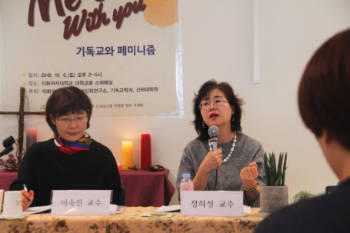
Students and theology experts of gathered on Oct. 6 at University Church to discuss the theological understanding of sexual violence and misogyny and discuss the status quo of #MeToo movements in Christian environments.
Under the title “Me Too, With You: Christianity and Feminism,” the symposium was organized by the Ewha Theological Community, Ewha Institute for Women’s Theological Studies (EIWTS), the Department of Christian Studies, and the Ewha Graduate School of Theology.
Chae Soo-ji, head of the Christian Women’s Counseling Center, was invited to the event and presented her research on pastoral sexual abuse in Korea and discussed the key tasks Christian communities face in order to reform its authoritarian culture.
“According to last year’s survey carried out by the Presbyterian Church of Korea, 31 percent of respondents said they experienced some form of sexual harassment – which was a shocking number,” Chae said. “Although media attention on last August’s attempted child rape by a pastor pushed some churches to take action, others are rejecting requests for further measures.”
Pointing out that victims of sexual abuse are often silenced by witch-hunting and accusations of adultery, she emphasized the need for Christian organizations to take action.
Professor Kim Hye-ryung from the HOKMA College of General Education called for a reconsideration of how we should understand the ethicality of sex. Ancient societies punished adultery, prostitution, and sexual violence as equal “defilements.” Similarly, many ethicists denounced any extramarital affair because it violated the oath of fidelity, and people often view victims of sexual assault as “crime-inducers.”
“The traditional view that sees marriage and fidelity as standards of ethicality can explain nothing about the immorality of sexual violence which can happen regardless of marital relationships,” Kim said. “I find sexual violence as immoral because it is a coerced destruction of the counterpart’s ‘otherness,’ which is what lies in the core of love’s longing towards another.”
Presenters emphasized that a critical, unbiased approach on these topics – sex, sexuality, and the body – are required for a complete change in our attitude towards these delicate subjects, since they are often exempted from or lopsidedly proposed in education curricula.
“Our churches don’t even touch upon the subject of sexuality because we have a culture of regarding sexuality and the female body itself as a sin,” said professor Paik Eun-mi from the Department of Christian Studies. “This is a huge problem because the absence of education does not simply result in ignorance, but provides room for distortion, and creates a prejudiced view towards the subject.”
Professor Paik continued that the absence of women and women’s sexuality in religious texts and activities have led to a very narrow-minded understanding of women’s spiritual and secular lives.
“In order to break down the tradition of misogyny that we have acquired from the unspoken premises of religious bodies, it is required for members of the community to actively rethink on how we are teaching gender, sexuality and the body,” she said.

